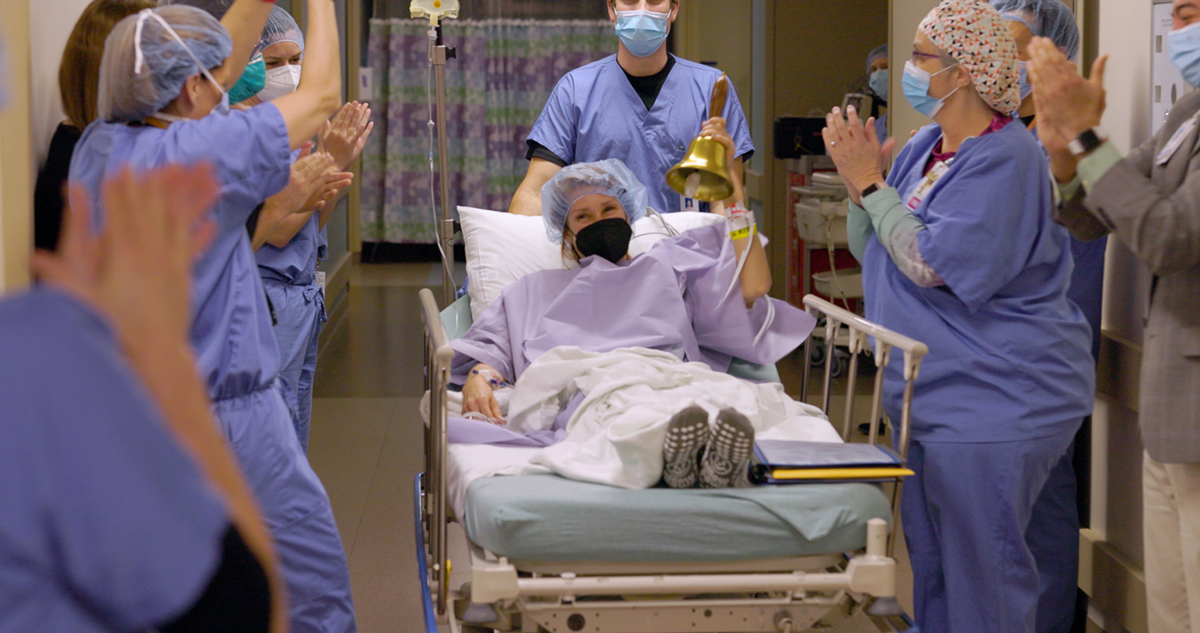Abdominal Transplant Center celebrates two “firsts” in one week

The end of February marked two major milestones at the new Adult Abdominal Transplant Center, a clinical partnership between Ascension Seton and UT Health Austin. The Center, a program of Dell Seton Medical Center at The University of Texas, diagnoses, treats, and manages the care of adult patients in need of a kidney, as well as those willing to be a living kidney donor. With more than 72,000 Texans living with end-stage renal failure, this transplant program offers them their best chance at a better life.
On February 22, physicians at Dell Seton performed the Center’s first living donor retrieval and transplant when Kayla Wright, 33, gave a kidney to her cousin Dom Rainelli, 23. Just two days later, the transplant team was back in the OR performing its first altruistic donor surgery. Victoria Threadgould (pictured above) was the first donor at the Center to choose to donate one of her kidneys to a nondirected recipient through the National Kidney Registry, meaning Victoria did not know the person who would receive her kidney.
Kidney failure, or end-stage renal disease, occurs when kidneys can no longer function at a level needed for daily life. Once this occurs, the work of the kidneys – filtering the blood to remove waste and excess water – can be done by dialysis, or the kidneys may be replaced through transplantation. The advantage of transplantation over dialysis is enabling patients to return to a more normal lifestyle.
“As a partnership between Ascension Seton, Dell Seton Medical Center and UT Health Austin, the kidney transplant program leverages the strengths and resources of our clinical leaders and community physicians,” said Dr. Nicole Turgeon, Transplant Director for the Adult Abdominal Transplant Center and professor in the Department of Surgery and Perioperative Care at Dell Medical School at The University of Texas at Austin Dell Med. “We aim to be recognized as one of the premier solid organ transplant centers in the country. But most importantly, this program is a hopeful resource for patients with complex transplant cases,” she said.
Organ transplant is not only a major surgery, but also an extensive process involving regular testing and ongoing communication between patient and medical team as candidates await donor organs. This new program brings care closer to home so they can better reach all the milestones required before and after surgery, and receive valuable education and support.
“The transplant program will offer advanced care for kidney failure patients using innovative treatments and state-of-the-art technology. Our collaborative team of renowned surgeons, specialists and staff will provide excellent care for the Central Texas community,” said Timothy Brierty, regional hospital president at Dell Seton Medical Center at The University of Texas.
The center expects to do 15 to 20 kidney transplants the first year and then grow to 75 transplants a year within five years and to 150 within 10 years. Currently, it has 14 people who are on the waiting list, six of whom are ready for a kidney offer. It has had 198 recipient referrals and 18 donor referrals.
A Selfless Act: The Gift of Life
In patient Kayla’s case, she was fortunate to have her kidney donated by her cousin, but many are not so lucky. The average wait time for a donor kidney is about three to five years, and even longer in some areas of the country, according to the National Kidney Foundation. Last week was another milestone moment when the center performed its first donated kidney retrieval for a nondirected gift through the National Kidney Registry. Nondirected means that the donor did not know the person who would get the kidney.
In Victoria’s case, she doesn’t know anyone with kidney disease, but her passion for helping people led her to research the idea of organ donation. Her selfless act ultimately is a gift of life for someone else–someone she doesn’t even know.
We will share a more in-depth story of Victoria’s journey as an organ donor during Donate Life Month in April.
Ascension Texas to Expand Abdominal Transplant Program to Keep Central Texans Closer to Home for Care
Dell Seton’s center plans to bring pancreas transplants to Austin within a year and liver transplants in three to five years. In April, Dell Children’s is expected to launch its pediatric kidney transplants as well. Currently, patients who need liver, pancreas or pediatric kidney transplants travel to San Antonio, Houston or Dallas for care.
